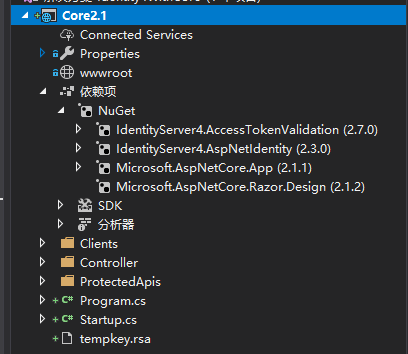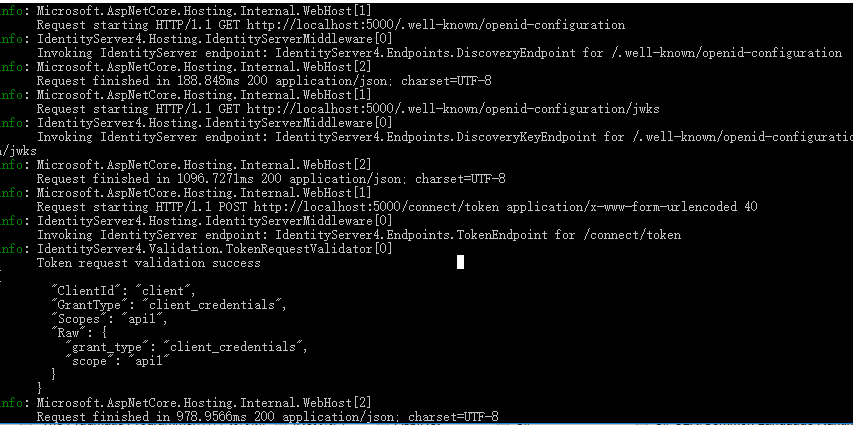Identity Server4学习系列三
1、简介
在Identity Server4学习系列一和Identity Server4学习系列二之令牌(Token)的概念的基础上,了解了Identity Server4的由来,以及令牌的相关知识,本文开始实战,实现Identity Server4基本的功能。
2、前提
本文基于.Net Core2.1和Indetity Server4 2.3.0,令牌处理包采用IdentityServer4.AccessTokenValidation 2.7.0
3、实战一Identity Server4服务端配置
(1)、项目结构

(2)、站点入口文件Program.cs类
public class Program { public static void Main(string[] args) { CreateWebHostBuilder(args).Build().Run(); } /// <summary> /// 设置当前项目的服务器宿主,Windows下默认为IIS /// 设置启动类为Startup类 /// </summary> /// <param name="args"></param> /// <returns></returns> public static IWebHostBuilder CreateWebHostBuilder(string[] args) => WebHost.CreateDefaultBuilder(args) .UseStartup<Startup>(); }
注意:如果时Linux环境,这里在这里可以切换站点的宿主服务器
(3)、Startup启动类(配置Identity Server4的相关参数和MVC的相关参数,并注入到管道模型中)
public class Startup { // This method gets called by the runtime. Use this method to add services to the container. // For more information on how to configure your application, visit https://go.microsoft.com/fwlink/?LinkID=398940 public void ConfigureServices(IServiceCollection services) { //优雅的链式编程 //注入Identity Server4服务到DI容器中 services.AddIdentityServer() //注入临时签名凭据到DI容器,后期可用签名证书的密钥替换,用于生成零时密钥 .AddDeveloperSigningCredential() //注入需要受Identity Server4保护的Api资源添注入到DI容器中 -内存级别 .AddInMemoryApiResources(Apis.GetApiResources()) //注入需要访问受Identity Server4保护的Api资源的客户端注入到DI容器中 -内存级别 .AddInMemoryClients(ThirdClients.GetClients()); //注入基本的MVC服务 services.AddMvcCore() //注入MVC的认证服务,对应控制器的Authorize特性 .AddAuthorization() //注入MVC格式化程序,对应JsonResult等等的格式化操作,主要用于控制器返回值的格式化操作 .AddJsonFormatters(); //注入身份认证服务,设置Bearer为默认方案 services.AddAuthentication("Bearer") //注入并配置Bearer为默认方案的基本参数 .AddIdentityServerAuthentication(options => { //设置令牌的发布者 options.Authority = "http://localhost:5000"; //设置Https options.RequireHttpsMetadata = false; //需要认证的api资源名称 options.ApiName = "api1"; }); } // This method gets called by the runtime. Use this method to configure the HTTP request pipeline. public void Configure(IApplicationBuilder app, IHostingEnvironment env) { //如果当前时开发者模式 if (env.IsDevelopment()) { //从管道中捕获同步和异步System.Exception实例并生成HTML错误响应。 app.UseDeveloperExceptionPage(); } //将IdentityServer 4服务注入到管道模型中(对应上面的IdentityServer 4服务的配置) app.UseIdentityServer(); //将认证服务通过Microsoft.AspNetCore.Authentication.AuthenticationMiddleware中间件 //注入到管道模型中(对应上面认证服务的配置) app.UseAuthentication(); //将mvc添加到Microsoft.AspNetCore.Builder.IApplicationBuilder请求执行中(对应上的MVC配置) app.UseMvc(); } }
(4)、配置第三方客户端能成功在认证模式下能成功访问Api资源的资本参数
/// <summary> /// 配置可以访问IdentityServer4 保护的Api资源模型的第三方客户端 /// 配置客户端访问的密钥 /// 配置 /// </summary> public class ThirdClients { public static IEnumerable<Client> GetClients() { return new List<Client>() { new Client() { //客户端的唯一Id,客户端需要指定该ClientId才能访问 ClientId = $"client", //no interactive user, use the clientid/secret for authentication //使用客户端密钥进行认证 AllowedGrantTypes = GrantTypes.ClientCredentials, // 认证密钥 ClientSecrets = { //用Sha256对"secret"进行加密,客户端必须使用secret密钥才能成功访问 new Secret("secret".Sha256()) }, // scopes that client has access to //如果客户端的密钥认证成功,限定该密钥可以访问的Api范围 AllowedScopes = { "api1" } } }; } }
注意ClientId(分配给不同客户端的Id),对应的客户端调用时传递过来的ClientId必须一致,否则客户端发起调用时汇报这个错:

密钥也是一样,密钥是我们分配给客户端的,客户端只有给对了我们分配给它的ClientId和密钥的同时,才能访问对应的api,所以如果你的密钥不对,客户端发起调用时也会报这个错:

(5)、配置受保护的Api资源模型
public class Apis { //ApiResource -IdentityServer4.Models下的Api资源模型 public static IEnumerable<ApiResource> GetApiResources() { return new List<ApiResource>() { //Api资源模型 new ApiResource("api1", "My API") }; } }
注意ApiRescourse的名称必须和Client的AllowedScopes属性对应,否则客户端调用时会报下面这个错:

(6)、验证服务端是否配置成功
开启站点,浏览器输入http://localhost:5000/.well-known/openid-configuration,等到如下返回报文说明服务部署成功:
{
//令牌签发者,对应StartUp中的Identity Server4中的认证配置 "issuer":"http://localhost:5000",
//jwt令牌处理地址 "jwks_uri":"http://localhost:5000/.well-known/openid-configuration/jwks", "authorization_endpoint":"http://localhost:5000/connect/authorize", "token_endpoint":"http://localhost:5000/connect/token", "userinfo_endpoint":"http://localhost:5000/connect/userinfo", "end_session_endpoint":"http://localhost:5000/connect/endsession", "check_session_iframe":"http://localhost:5000/connect/checksession", "revocation_endpoint":"http://localhost:5000/connect/revocation", "introspection_endpoint":"http://localhost:5000/connect/introspect", "device_authorization_endpoint":"http://localhost:5000/connect/deviceauthorization", "frontchannel_logout_supported":true, "frontchannel_logout_session_supported":true, "backchannel_logout_supported":true, "backchannel_logout_session_supported":true, "scopes_supported":[ "api1", "offline_access" ], "claims_supported":[ ], "grant_types_supported":[ "authorization_code", "client_credentials", "refresh_token", "implicit", "urn:ietf:params:oauth:grant-type:device_code" ], "response_types_supported":[ "code", "token", "id_token", "id_token token", "code id_token", "code token", "code id_token token" ], "response_modes_supported":[ "form_post", "query", "fragment" ], "token_endpoint_auth_methods_supported":[ "client_secret_basic", "client_secret_post" ], "subject_types_supported":[ "public" ], "id_token_signing_alg_values_supported":[ "RS256" ], "code_challenge_methods_supported":[ "plain", "S256" ] }
参数含义,自行了解
3、实战一客户端调用受Identity Server4保护的Api资源
(1)、前提
客户端必须安装IdentityModel 3.10.4包
(2)、调用代码如下:
class Program { static void Main(string[] args) { Request(); Console.ReadKey(); } async static void Request() { //请求Identity Server4服务 var disco = await DiscoveryClient.GetAsync("http://localhost:5000"); if (disco.IsError) { Console.WriteLine(disco.Error); return; } //生成Identity Server4授权的客户端,通过指定对应的ClientId和密钥(secret) var tokenClient = new TokenClient(disco.TokenEndpoint, "client", "secret"); var tokenResponse = await tokenClient.RequestClientCredentialsAsync("api1"); if (tokenResponse.IsError) { Console.WriteLine(tokenResponse.Error); return; } Console.WriteLine(tokenResponse.Json); //通过Identity Server4的认证过后,拿到AccessToken var client = new HttpClient(); client.SetBearerToken(tokenResponse.AccessToken); var response = await client.GetAsync("http://localhost:5000/identity"); if (!response.IsSuccessStatusCode) { Console.WriteLine(response.StatusCode); } else { //认证成功,输出Identity控制器的返回值 var content = await response.Content.ReadAsStringAsync(); Console.WriteLine(JArray.Parse(content)); } } }
得到如下报文:

同时查看Identity Server4服务端的输出:
第一步:客户端传入在Indetity Server4中注册过的分配给该客户端的ClientId和密钥,拿到AccessToken

第二步:第一次请求目标控制器,并把AcessToken带过去

第三步:验证Token是否有效

第四步:Token有效,开始调用Identity控制器方法,并拿到响应值

大致的流程如上.



 浙公网安备 33010602011771号
浙公网安备 33010602011771号